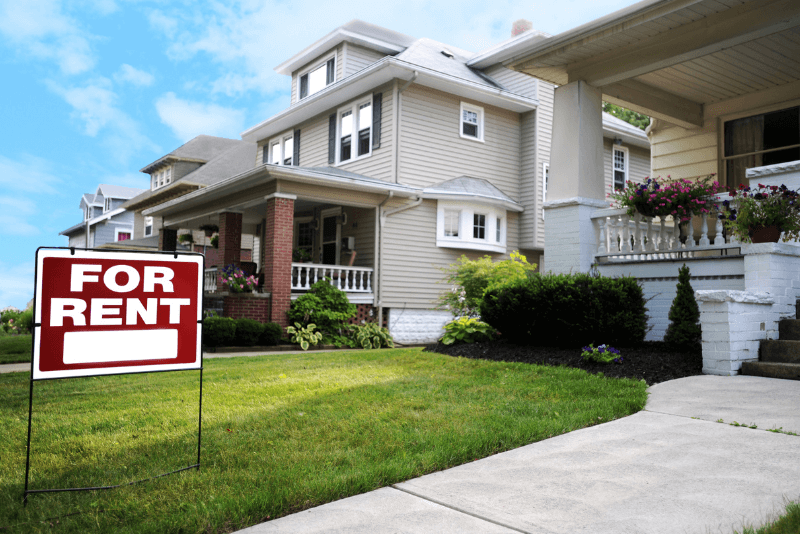
Deciding whether to rent or sell your property can be daunting, as each option has its benefits and drawbacks, largely contingent on your financial situation and the housing market.
Benefits of Renting a Property Over Selling a Home
Renting a property has often been seen as an appealing alternative to selling, especially for those looking to maintain a long-term investment in the real estate market or those hoping to capitalize on rental income.
Long-Term Investment
Renting out your property can provide you with a sustainable long-term investment. It allows homeowners to retain ownership, offering the possibility of property values increasing over time, thus leading to higher profits if and when the owner decides to sell.
House Price Could Rise
In a favorable real estate market, house prices may appreciate, allowing homeowners to sell for more than the initial purchase price.
Owners can benefit from the property’s appreciation while earning rental income by renting out the property in the interim.
It’s particularly advantageous in areas like New York and California where property values tend to surge due to high demand.
Your Rent May Provide Additional Income
Renting out your property can be a source of regular additional income. The monthly rent can cover the mortgage payment, property taxes, and property management fees, potentially leaving some extra as passive income.
However, to maximize rental income, homeowners should stay informed about the current market rental price and adjust accordingly, avoiding vacancies and ensuring a steady cash flow.
If the notion of selling arises, reaching out to get a cash offer for your house in Minneapolis could streamline the selling process.
Remember, utilizing a reputable property management company can alleviate the burden of maintenance and dealing with renters, allowing homeowners to enjoy the financial benefits with less hassle.
Benefits of Selling a Property Over Renting a Home
Choosing to sell a property over renting it out can present several advantages, particularly when the real estate market is thriving and home prices are at a premium.
While renting provides a steady income stream, selling can offer immediate financial gains and relieve the homeowner of property management duties and responsibilities.
Immediate Income Stream
Selling a property provides homeowners with an immediate influx of money, enabling them to pay off debts, make new investments, or address other financial needs. Plus, selling is easy if you work with a home buyer, such as a company that advertises, “We buy houses in Woodbury.”
This immediate liquidity can be especially beneficial for those looking to reinvest in a more lucrative venture or needing to settle outstanding financial obligations.
The substantial amount received from a sale can also be pivotal for homeowners looking to purchase a new home, providing them with the necessary funds for a down payment or even to buy the new property outright.
Opting for selling over renting eliminates the hassle of dealing with tenants and the uncertainty of fluctuating rental income, providing a swift and substantial financial boost.
House Prices Are High as Of Now
Selling can be significantly profitable with the real estate market experiencing high property values. Homeowners can leverage the elevated market prices to secure a lucrative deal, potentially earning more from the sale than they would through years of rental income.
Selling in a seller’s market ensures maximum return on investment, allowing homeowners to capitalize on their property’s value.
This scenario is particularly favorable for those whose properties have appreciated over the years, enabling them to reap the benefits of their investment’s increased value.
For those considering selling, reaching out to the best cash home buyers in Minnesota can streamline the process, offering a hassle-free and expedient transaction, and enabling homeowners to access the financial gains from their property sale quickly.
Need to Sell Your House Fast?
We make selling your house a simple affair.
Just fill out the form below or give us a call at: (612) 260-5577 to get your free, no-obligation cash offer!
Disadvantages of Renting a Property Over Selling a Home
While renting out a property can offer financial benefits and serve as a long-term investment, it does come with its share of challenges and potential drawbacks, mainly related to property management and tenant relations.
Being a Landlord Can Be Tough
Assuming the role of a landlord can be demanding. It involves dealing with property upkeep, landscaping, and occasional emergencies.
Responsibilities also include adhering to regulations and addressing tenants’ concerns promptly, which can be time-consuming and stressful.
A property management company can handle such tasks but incurs additional fees, impacting the overall rental income.
If the hassles of being a landlord seem overwhelming, deciding to sell your rental property is a way to shift from rental headaches to a hassle-free sale.
Some Tenants Cause Real Issues
Handling tenants can pose challenges, especially if they fail to comply with rental agreements, delay payments, or cause damage to the property.
Eviction can be lengthy and arduous, often causing stress and financial loss. It is paramount to have stringent tenant screening processes and understand tenants’ rights and landlord obligations to mitigate such issues.
For homeowners contemplating transitioning from renting to selling, exploring resources like selling a house without a realtor in Minnesota can offer insights into efficient selling strategies without the involvement of a brokerage.
Balancing the advantages and drawbacks of renting and selling requires thoroughly analyzing one’s financial situation, the local rental market, and real estate market conditions, ensuring that the chosen path aligns with one’s financial goals and lifestyle preferences.
Remember, what works for one homeowner may not work for another, so making an informed decision is crucial.
Disadvantages of Selling a Property Over Renting a Home
Selling is appealing due to the immediate influx of cash and relief from property management responsibilities.
Still, it has its downsides, especially when considering long-term financial growth and the impact of market fluctuations.
Loss of a Potential Long-Term Investment
When you sell, you forfeit the potential long-term benefits of property ownership, such as ongoing rental income and property appreciation.
Selling implies that you’ll lose out on potential passive income that you could have earned through renting.
Additionally, there’s a possibility of missing out on significant property value appreciation over the years due to market trends, local developments, or property upgrades.
While selling can provide immediate financial relief, weighing this against the prospective long-term gains and wealth accumulation that holding onto the property could offer is essential.
Inflation and Potential Economic Issues Could Reduce Prices
Property prices can significantly impact fluctuating economic landscapes where inflation and economic instability loom.
Reduced property values can result in selling at a loss, especially if the market is experiencing a downturn at the time of sale.
Economic instability might lead to increased interest rates, reducing the pool of potential buyers and decreasing property demand and prices.
Selling in such a scenario can be financially detrimental, and holding onto the property and renting it out might be a more prudent option until the economic and real estate market conditions stabilize.
How Will The Economy Affect Your Decision
Current and anticipated economic conditions play a crucial role in determining whether to rent out or sell a property.
Analyzing economic indicators and market trends is crucial to making an informed decision that aligns with your financial goals and circumstances.
Analyzing Market Trends and Economic Indicators
Before deciding to sell or rent, a thorough analysis of market trends, property values, and economic indicators is pivotal.
Understanding the current market conditions, whether a buyer’s or seller’s market, can help set realistic expectations for sale prices or rental income.
Evaluating economic indicators like unemployment, inflation, and interest rates can provide insights into the overall economic environment and its potential impact on real estate markets.
A favorable economic climate with low-interest rates and high demand can be the optimal time to sell, while a sluggish market with reduced buyer interest might favor renting.
Long-Term Economic Projections and Property Values
Assessing long-term economic forecasts and their implications on property values is essential. An upward trajectory in property values and a robust economic outlook make selling more appealing, while stagnant or declining projections suggest renting as the more viable option.
Considering potential future developments, infrastructural projects, and zoning changes in the local area can also influence property values and should factor into the decision-making process.
Keeping abreast of local real estate market trends and economic developments will aid in making a financially sound decision in line with long-term objectives.
Impact of Economic Conditions on Renting
Economic conditions significantly influence the rental market, impacting rental prices, tenant demand, and vacancy rates.
During economic downturns, homeowners might find renting a more stable option, as the housing market might be saturated, and selling prices may need to be more optimal.
However, economic instability can also affect the rental market, with potential decreases in rental prices and increased vacancies due to reduced consumer spending power.
Monitoring economic conditions and adapting strategies accordingly is essential for maximizing rental income and maintaining property value in varying economic climates.

Conclusion
Deciding whether to rent or sell your property involves considering the current market conditions, your financial situation, and your willingness to take on the responsibilities of being a landlord.
- Selling offers immediate financial gain and can be lucrative in a high-value market, freeing you from property management concerns.
- Renting can provide a consistent income stream and potential long-term benefits if property values increase.
Each option has advantages and disadvantages, and ultimately, the choice depends on individual circumstances, financial needs, goals, and preferences in property management and investment strategy.
